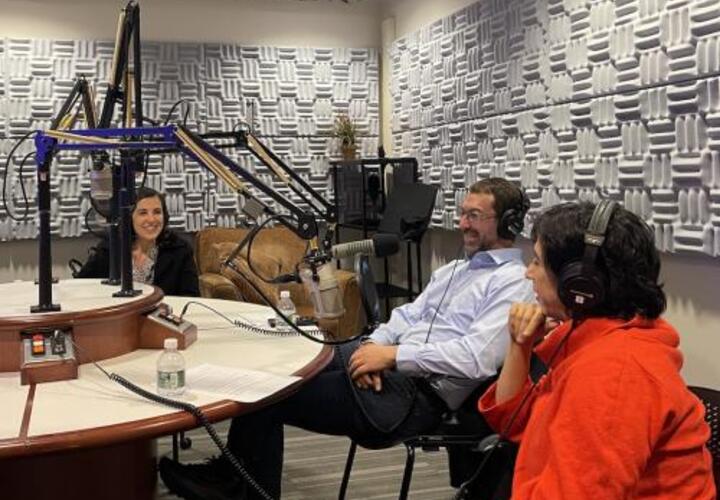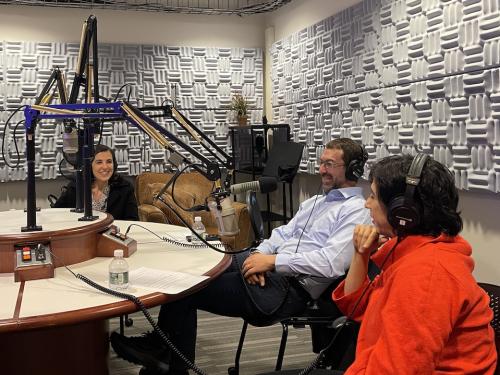EGC Voices in Development Podcast, Episode 8: Eliana La Ferrara, Samuel Moyn, and Rohini Pande
This podcast series explores issues related to sustainable development and economic justice in low- and middle-income countries. Episode 8 is a Yale Development Dialogue on the role of social norms in development, featuring Eliana La Ferrara, Professor of Public Policy at Harvard Kennedy School; Samuel Moyn, Chancellor Kent Professor of Law and History at Yale; and Rohini Pande, Henry J. Heinz II Professor of Economics and Director of the EGC. They discuss the effects of norms – especially those that are long-entrenched and harmful to certain groups or individuals – on the economic, social, and legal dimensions of development.

Unraveling the impact of harmful social norms on development: Eliana La Ferrara, Samuel Moyn, and Rohini Pande on addressing hidden barriers to progress
EGC Voices in Development, Episode 8 • Transcript

Photo by Zahrah Abdulrauf
How do social norms – the set of informal rules, beliefs, and biases that govern behavior in a given group or society – affect the development process? While positive norms can support and accelerate development, harmful ones like slavery or female genital cutting can constrain it, exacerbating poverty and inequality. While social change in many high-income countries has reduced the prevalence of the most harmful norms over time, they continue to exist in many low- and middle-income countries, often preventing disadvantaged communities and groups from reaching their full potential.
In this episode of EGC Voices in Development, Rohini Pande is joined by Eliana La Ferrara and Samuel Moyn to discuss the “stickiness” of harmful social norms, both today and throughout history – and how changing such norms is often at the heart of the development challenge.
Rohini Pande, Henry J. Heinz II Professor of Economics and Director of EGC, frames the discussion by considering how research in development economics often approaches norms from the perspective of political economy, which often focuses on formal institutions. While this has generated important insights about the role and influence of formal institutions on economic development, it has focused less on how harmful norms can be perpetuated through informal institutions – such as marriage dynamics within individual households – and how these can impede development.
We think a lot about institutions, but the literature focuses on formal institutions. So I've been very interested in trying to think about norms through a lens of informal institutions – where there are some sets of individuals who may want to enforce existing norms because it serves their purpose. We are very comfortable talking about class interests and rent seeking, [for example,] but [we are] sometimes [less comfortable] thinking about [those issues] within a household, [where] people who live together might not have aligned preferences and may actually actively prevent someone from achieving what they want to do. – Rohini Pande
Samuel Moyn, Chancellor Kent Professor of Law and History, notes that we can learn many lessons from historical examples of advocacy for social change. In the United States in the 19th century, for example, abolitionists confronted an entrenched set of political, social, and economic systems in their fight to abolish slavery. Moyn underscores the difficulties abolitionists faced in seeking to spark that change, and the radical shifts in social norms that were required.
In the last few hundred years, there have been revolutionary emancipatory changes. What in fact happened is people changed their normative standards and accepted new ends, and therefore [accepted] the destruction of their prior way of life. – Samuel Moyn
Eliana La Ferrara, Professor of Public Policy at Harvard Kennedy School, draws on her research on female genital cutting in Sierra Leone and Somalia to analyze the role of social and cultural norms in economic development. She notes the cultural weight of the harmful practice in some cases, but has also noticed that the persistence of such practices often arises not from widely-held social beliefs, but the perception that these beliefs are widely held – a phenomenon in social psychology known as “pluralistic ignorance.”
There are instances where this stickiness of harmful norms or traditions also comes from lack of knowledge of how the underlying fundamentals in the economy or in society have evolved. [...] It is possible for each individual in isolation to hold these incorrect beliefs. – Eliana La Ferrara
This wide-ranging discussion touches on many examples of harmful norms, both from history and today, and considers how they might be changed at the grassroots and broader levels. Indeed, a key challenge is embracing the notion that changing harmful norms can unlock development success.
[As] economists, one thing we perhaps have to deal with is to move away a little bit from our easy fallback on efficiency as what we want to maximize. [It] is a reminder to be more optimistic about, you know, the good things that can happen in the world. – Rohini Pande
About the guests
Eliana La Ferrara is a Professor of Public Policy at Harvard Kennedy School. She is 2nd Vice-President of the Econometric Society and Program Director of Development Economics for the Center for Economic Policy Research (CEPR). She is also a J-PAL Affiliate, a Foreign Honorary Member of the American Economic Association, and an International Honorary Member of the American Academy of Arts and Sciences. Her research focuses on Development Economics and Political Economics, particularly on the role of social factors in economic development. Methodologically, she combines fieldwork, rigorous empirical analysis, and microeconomic theory to address questions at the intersection of economics and other social sciences. She has studied ethnic diversity, kin structure and social norms, and the effects of television on social outcomes. She has also investigated political constraints to development, with particular focus on violent conflict in Africa. She regularly collaborates with governments and international organizations to evaluate the effectiveness of development policies.
Samuel Moyn is Chancellor Kent Professor of Law and History at Yale University. He received a doctorate in modern European history from the University of California-Berkeley in 2000 and a law degree from Harvard University in 2001. He came to Yale from Harvard University, where he was Jeremiah Smith, Jr. Professor of Law and Professor of History. Before this, he spent thirteen years in the Columbia University history department, where he was most recently James Bryce Professor of European Legal History. His areas of interest in legal scholarship include international law, human rights, the law of war, and legal thought, in both historical and current perspective. In intellectual history, he has worked on a diverse range of subjects, especially twentieth-century European moral and political theory.
Rohini Pande is the Henry J. Heinz II Professor of Economics and Director of the Economic Growth Center, Yale University. She is a co-editor of American Economic Review: Insights. In 2018, Pande received the Carolyn Bell Shaw Award from the American Economic Association for promoting the success of women in the economics profession. She is the co-chair of the Political Economy and Government Group at the Abdul Latif Jameel Poverty Action Lab (J-PAL), a board member of Bureau of Research on Economic Development (BREAD) and a former co-editor of The Review of Economics and Statistics. Before coming to Yale, Pande was the Rafik Harriri Professor of International Political Economy at Harvard Kennedy School, where she co-founded Evidence for Policy Design. Pande received a PhD in economics from London School of Economics, a BA/MA in Philosophy, Politics and Economics from Oxford University and a BA in Economics from Delhi University.